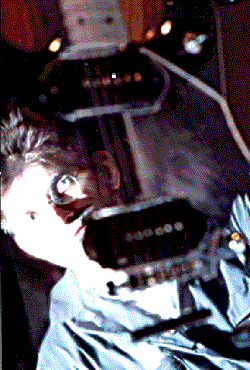 |
 |
| An
interview with Steve Albini by Robert Becraft |
Robert Becraft: Repetition and rhythm play a pivotal role in Shellac.
How do you avoid falling into punk rock mayhem or paltry primitivism?
Steve Albini: I guess what you're asking is how do you avoid sucking.
Everybody has impulses, or everybody has stock moves [that] if they're
not paying attention they can gravitate toward. The key is to pay attention
all the time. If it starts sounding lame, stop.
RB: Single chords seem to be played for well over a minute in many
Shellac songs. How do you avoid sounding strum-happy?
SA: When you do something that's got a static element, it's not
necessarily that you've picked the one perfect note or the one perfect
chord to play for a really long time. It's the mood that's generated by
the one note or the style of playing that you can explore while you're
playing the one note. And that's sort of an anti-harmonic compositional
thought. There's a school of thought that certain pitches have meaning
in themselves, and then there's another school of thought that the structure
in which you play any particular note defines that note. I'd say that's
probably more in keeping with the way we think.
RB: There is something unpredictable and gestalt-like about Shellac:
attractiveness despite a macho sound and silly lyrics, and sophistication
despite stripped-down, almost simple song structures. Is this humor?
SA: Well, there are funny elements in what we do, and it would
be a shame if we went through all this trouble and nobody laughed. [Laughs.]
But I don't think that we've got any one particular perspective on it.
I mean, in your average day in your average conversation there can be
moments that are kind of sad, and it's really only a reflex action on
our part to incorporate all that stuff. There could be times when you're
inconsolably sad about something, and you'll get a glimpse of a Three
Stooges movie or something, and you'll just break up laughing, and you
can't really help yourself. It's totally inappropriate, but I guess it's
part of our aesthetic to try to incorporate stuff like that.
RB: Do lyrics to numbers like "Squirrel Song" or "Watch
Song in 1000 Hurts" come from self-mocking levity or genuine masculinity?
SA: I would say the sexual component to our music is pretty small,
and I don't think we deal with an awful lot of the male/female. The "Watch"
song, for example, was genuinely inspired by a shitty watch I had. It
expanded into this notion of wanting to fight with our equipment, and
then [of] personifying all the things we have to deal with. The "Squirrel
Song" is basically just a short story. It's just about this guy who becomes
suspicious of the power of the distribution grid and he wants to separate
himself from it, so he builds a squirrel-powered generating plant so that
way he can be self-sufficient. The problem is, of course, he has all these
squirrels, and he then has to tend all the squirrels, and it takes up
all his time. And they only really generate enough power to keep the lights
on in the squirrel house. Even then, they hibernate all winter. Also,
this dude has invented this bogie man [in] the power grid, [and] he decides
to sidestep it by building a squirrel power plant that ends up totally
consuming his life - and it doesn't accomplish what he wants it to.
RB: Is Shellac's simplicity an ironic adherence to the essence
of pop and rock, repetition and rhythm?
SA: No, I think we just try to avoid stock moves. Most people try
to produce something that they think is classic by way of it being familiar
to them. Our impulse as a band has always been to go in the opposite direction.
If we're doing something and it's reminiscent of something else, that's
the first indication that it's probably not a good idea. That's one way
of doing things. After ten years of playing together, certain patterns
will develop and certain elements of our tastes will develop and occasionally
we'll want to indulge those. "I just like it when things go bang
bang bang. I just like it."
RB: How did your belt guitar strap come about?
SA: If you wear a guitar around your neck, your neck hurts. I just
tried it once when I was really young and it seemed like an obvious solution,
so I stayed with it.
![]()
RB:It's not to allow for more movement? br> SA: Well, it's
nice. There's nothing dangling around my neck, so there is more freedom
of movement, and wherever you go, your guitar always stays in the same
relative position against your abdomen.
RB: Is a Shellac show ultimately a physical experience for you?
SA: Well, I'm really tired when we're through with the show. I
suppose it's the only thing in my life that counts as exercise. [Laughs.]
But I'm not conscious of a theatrical component.
RB: Why is Shellac a three-piece? Are there advantages and disadvantages?
SA: Oh, there are a lot of advantages to being in a three-piece. The
principle one being that you don't have too many people to tell what to
do. And the dynamics of playing with three people are great. If one person
drops out or if one person steps up, it's a pretty dramatic change. If
there were five or ten people involved, then there would always be some
sort of static level of activity that you couldn't get beyond. I suppose
you have a broader pallet of sound to work with if you have more people
in the band, but I also feel like the broader palette of sound is often
used as an excuse for undisciplined or uninteresting music. With three
people, you get a really nice balance between this sort of group mind
and the individual personalities.
RB: How do you view heavily orchestrated bands?
SA: It's an impressive feat when that sort of interaction comes
off well. It's difficult to know what their motivations are, but when
it works well, it's impressive, and when it doesn't work well, it's preposterous.
But even the preposterous elements of things can be entertaining. So,
I'm impressed when it works, but you've seen any number of pointless,
piece-of-shit pop songs with a freaking orchestra back them up on the
television. I've seen a lot of rock bands retreat into production out
of fear, bands that were perfectly confident, regular rock bands that
suddenly felt compelled to put a glockenspiel string section and backing
vocalists on their records because that was the mode of the day. I think
that's a shame and I think that will date records terribly. In ten years,
we're gonna be hearing (if we listen to records from this period) certain
clichés that are gonna stick out like a sore cock. I think that
sort of kitchen-sink orchestration and production is going to be one of
them.
RB: How have audiences beyond the U.S. responded to Shellac? The
Japanese could be either reserved or ecstatically fanatic. How have tours
to Japan been? In Europe?
SA: We've been around long enough that we've attracted our own
specific audience. Pretty much wherever we play, we're not really getting
an accurate read on what the locale is like. What we're getting a read
on is: What does this small cadre of Shellac fans in this town think about?
RB: Have most tours been successes?
SA: Yeah, the only tour that ever amounted to being disappointing
is [when we] toured Wisconsin. We thought it would be funny. Everything
about the tour was great with the exception of the turnout at some of
the shows. I think it was this conceit that we developed [about touring]
Wisconsin that didn't really prove to be warranted. [Laughs.] Wisconsin
just couldn't take that much of it.
RB: How do you view Napster? I understand that the Futurist album,
which you have been protective of, is on the site.
SA: You know, Napster is a tool for people who have loads of time
on their hands. They just want to goof off at work, or they want to take
advantage of their school's computer and try to scam some stuff for free.
And to be honest, I couldn't care less. I don't feel cheated by it. I
don't feel like anybody is robbing me of anything by putting our music
on Napster. It's exactly the same as if somebody had a cassette copy of
something and they made a dub of it for their friend: lousy sound quality,
a lot of nuisance-it's something I would never bother doing myself. The
analogy is when I was twelve or thirteen years old, I would spend all
day trying to figure out how to sneak into a movie for free. A movie was
three dollars, but my time wasn't worth anything. There's that sense of
satisfaction of having outsmarted somebody. I think that's a part of why
people like to use things like Napster. I don't want to deny that, you
know. [Chuckles.]
 RB:
RB:
When and where did your musical career begin?
SA: I was in a goof-off band in Montana that solidified into a
punk rock band. That would have been around 1978 or '79. I left Montana
in 1980 to go to college.
RB: Speaking of your college education, are you still involved
in creative writing?
SA: Very rarely, I write technical articles for a recording journal.
I write short fiction for my own amusement, but I don't really see it
as a public endeavor.
RB: Never?
SA: Someday maybe, when I get old-when I'm old and deaf and can't
make records anymore. But I'm very self-conscious of the David Bowie effect,
which I find absolutely preposterous. Like, "I am a singer, therefore
I can act, therefore I am a painter, therefore I am a novelist," you know.
I just don't think that's valid. I feel like I should be content with
having a perfectly satisfying creative outlet in the band and that should
be enough. The stuff that I write, some of it's good, some of it's not
that good, but I don't see it as being as important to me as the band
is or as my day-to-day life as an engineer is. I wouldn't want to put
a book out just on a lark. That's something I resent when other people
do it.
I have this persistent nightmare that somehow or another I end up in a
college dormitory. I see this room with clothes littering the floor and
a couple of prefabricated shelving units stacked up with books in them,
and right there on that shelf there's Nick Cave's book, Henry Rollins's
book, and then there's my book. That would just kill me.
RB: I have never seen pants as tight as yours, but would you mind
telling F News about them?
SA: They are normal 501 Levi's, which a friend of mine pegs for
me because my legs are really skinny and I feel ridiculous wearing flappy
pants.
RB: My sincere apologies for the both flippant and ridiculous nature
of that question.
SA: Relax.